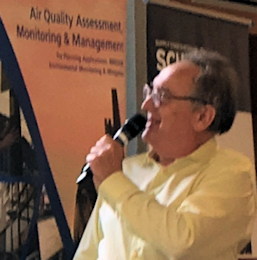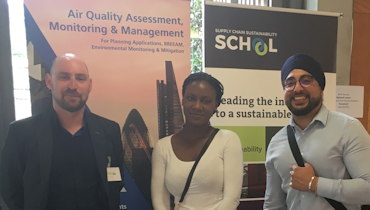Ben writes:
On Tuesday 2 July I attended a breakfast meeting in Lambeth on the subject of air quality.
It was hosted by the Supply Chain Sustainability School, in conjunction with the Mayor of London’s Climate Action Week.
After signing in and enjoying coffee and hot breakfast rolls the meeting began as Sean McCarthy, SCSS chair, gave an overview of the discussions and briefings to come.

Then James Brown from Stroma gave a briefing on air quality. He explained Stroma’s business and how the company offers air quality assessments within the construction industry.
Natalie Evans from Transport for London then gave the client’s perspective. Her subjects included the use of electric vehicles within the Square Mile, what TfL are doing to help improve the quality of air within central London, and the barriers they face.
At this point we were asked to discuss on our tables the opportunities and barriers to delivering sustainable outcomes in improving air quality within London and the construction industry. We also discussed what businesses could do to help improve air quality.
Then Nick Lovell from Tobermore described AirClean photocatalytic paving slabs, which help reduce NO2 (nitrogen dioxide) levels by 4-16% in certain areas. These are already in use in some areas in the UK and are a step in the right direction in controlling air quality in areas polluted by road traffic.
Flannery Plant Hire’s strategic manager Chris Matthews was next. He talked through driving behaviour in the industry, and how managing these will help reduce overall fuel use and improve air quality. He discussed hybrid plant, in particular how clients will want to see the use of tier 3 or higher equipment in future. Chris also talked about Flannery work groups called the Trailblazer, which discuss driver behaviour and fuel efficiency awareness.
In the UK 40,000 deaths occur each year related to poor air quality. Daniel Marsh from King’s College discussed the health effects of polluted air, and how the construction industry contributes to the problem within the London area. He talked about the HSE EH40 workplace diesel exhaust exposure limit, which has been in force since 2018.
The second group task of the morning was to discuss how can we deliver better air quality, after which some teams shared their ideas with everyone. The discussion also included deciding what every individual can do to help over the next week, month and year to help improve air quality in the construction industry and in London.
Air quality toolbox talk materials
The Supply Chain Sustainability School has created a free toolbox talk video on air quality. (You will need to log-in – it’s free – to search for the video.) We will share this with our teams (reminding the relevant people that they need the correct PPE to use breakers!). In particular, they can reduce emissions by not idling plant and vehicles, and by reporting any issues with machinery as soon as possible.
Main photo: me with Jaz and Beyant from Hounslow Council – we were on the same table for the discussions

